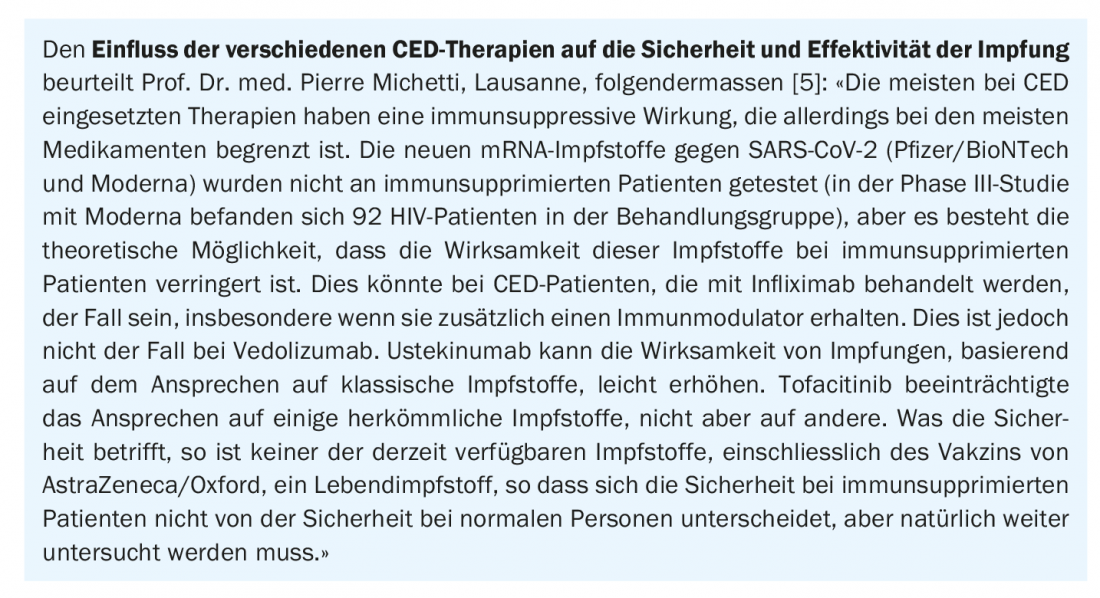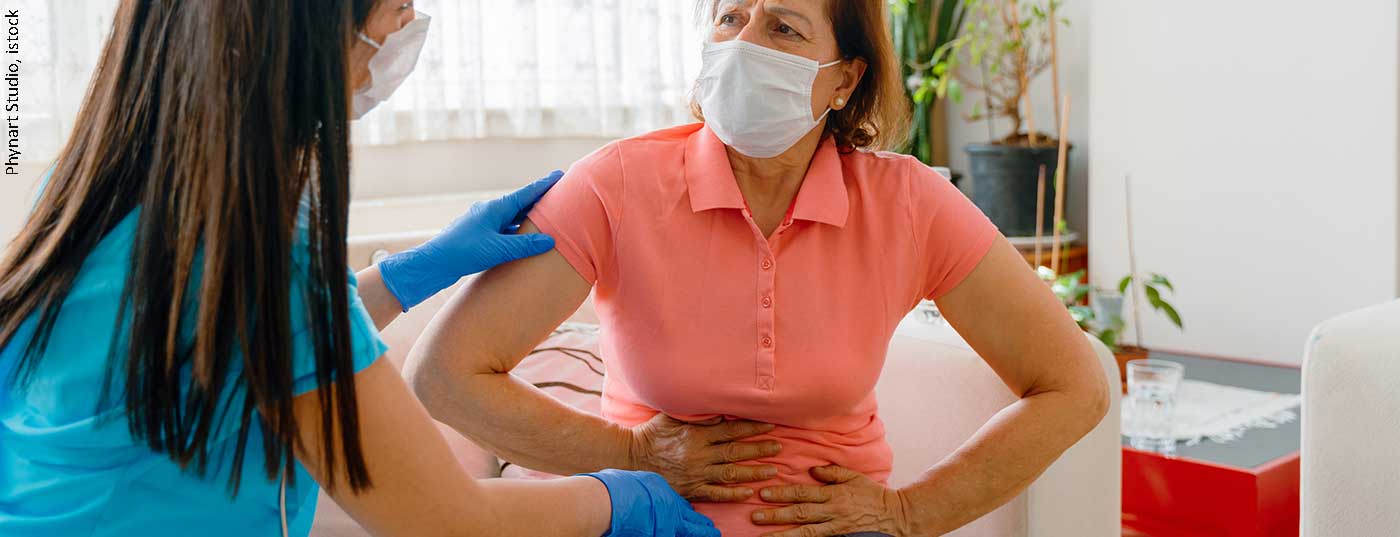The Swiss Research and Communication Network on Inflammatory Bowel Disease (IBD-net) recommends that all patients with inflammatory bowel disease (IBD) should be vaccinated against SARS CoV-2. This assessment is based on a benefit-risk assessment for this patient population, taking into account current data on risks for SARS-CoV-2 infection and severe progression, as well as indication and contraindication for vaccination in the context of ongoing CED therapies.
(red) A few months ago, under the auspices of the German Society of Gastroenterology, Digestive and Metabolic Diseases (DGVS), an addendum to the S3 guidelines on Crohn’s disease and ulcerative colitis was issued on issues related to the care of CED patients during the COVID-19 pandemic [1]. This will address the risk of infection, the possible course of COVID-19 disease, and the consequences for drug and surgical therapy of the underlying disease, as well as general measures for infection prevention. A position paper focusing on vaccination in the Swiss context was published this January by an expert committee of the Swiss Research and Communication Network on Inflammatory Bowel Disease (IBD-net). In it, gastroenterology experts PD Luc Biedermann, MD, Prof Stephan Vavricka, MD, PD Michel Maillard, MD, and Prof Pierre Michetti, MD, summarize the current evidence on SARS-CoV-2 infection and corona vaccination in patients with IBD [2–5]. The following is an excerpt from it:
Vaccination recommendation for CED patients
PD Michel Maillard, MD, Lausanne, summarizes the indications/contraindications for vaccine administration in CED patients as follows [4]: According to the January 7 Swiss Health Department report , patients with acquired or congenital immunodeficiency qualify for administration of the SARS-CoV-2 vaccine. Consistent with this statement, IBD is considered part of the immune-mediated inflammatory diseases. Despite the reassuring data described in the following section, patients with IBD are at increased risk for the occurrence of wasting, thromboembolic complications, or extra-intestinal manifestations. Moreover, they are more likely than the general population to be exposed to steroids or immunosuppressive medications that would increase their risk for an unfavorable outcome of COVID disease. “For these reasons, we believe that all patients with IBD should be vaccinated, regardless of their disease state or ongoing treatment,” said the expert [4]. Contraindications are those that apply to all groups, i.e., ongoing pregnancy, history of anaphylactic shock from a vaccine, fever >38°C in the past 48h, and any criteria requiring SARS-CoV-2 testing and ongoing quarantine.
Table 1 shows the vaccines approved in Switzerland with the most important information on efficacy and side effects according to phase I/II and phase III study data published to date [3].


SECURE IBD register as an important database
PD Dr. Luc Biedermann, Zurich, provides an overview of current data on the risk of SARS-CoV-2 in IBD patients [2]: The largest global reporting system for COVID-19 cases in patients with IBD, the so-called SECURE IBD registry (as of January 2021: >4000 cases reported), suggests the following important conclusions based on the data to date: The risk of a severe course of COVID-19, including the need for intensive care, respiratory support, or death, was not increased in CED patients receiving standard therapy (including biologics) [6]. However, the risk of adverse outcome was found to be significantly higher in patients who were taking systemic steroids at the time of COVID-19 infection. The impact of systemic steroids was comparable to other known risk factors such as comorbidities and advanced age. An increased risk of severe COVID-19 courses with thiopurine and anti-TNF combination therapy may be possible [7]. Although the SECURE-IBD registry has an extensive database and cases are reported worldwide, it does not provide a population-based picture of the risk of COVID-19 infection in patients with IBD compared with the general population. Important data from Denmark [8] clearly indicate that the risk of COVID-19 infection was not increased compared with the general population (at least in the first wave of infection in early 2020, when the study was conducted). Although this study does not allow conclusions to be drawn about the possible reasons for this rather lower risk of COVID-19 infection (e.g., more conservative and restrictive behavior with less exposure to potential infection in CED patients), these data are certainly reassuring and overall suggest that the risk of COVID-19 infection does not seem to be increased in inflammatory bowel disease in general and specifically in patients treated with immunosuppressants and biologics, confirming the SECURE-IBD results.
Literature:
- Stallmach A, et al: [Addendum to S3-Guidelines Crohn’s disease and ulcerative colitis: Management of Patients with Inflammatory Bowel Disease in the COVID-19 Pandemic – open questions and answers] [Article in German]. Z Gastroenterol 2020; 58(7): e367.
- Biedermann L: Current data on the risk of SARS-CoV-2 in IBD patients, IBDnet Position Statement on Covid-19 vaccination, 22 January 2021 (last accessed 24 Mar 2021).
- Vavricka S: Currently licensed vaccines in Switzerland, IBDnet Position Statement on Covid-19 vaccination, 22 January 2021, (last accessed 24 March 2021).
- Maillard M: Indications/contraindications for vaccine administration in IBD patients, IBDnet Position Statement on Covid-19 vaccination, 22 January 2021, (last accessed 24/03/2021).
- Michetti P: Impact of different CED therapies on the safety and efficacy of vaccination, IBDnet Position Statement on Covid-19 vaccination, 22 January 2021, (last accessed 24 Mar 2021).
- Brenner J, et al: Corticosteroids, But Not TNF Antagonists, Are Associated With Adverse COVID-19 Outcomes in Patients With Inflammatory Bowel Diseases: Results From an International Re-gistry. In: Gastroenterology 2020; 159 (2), 481-491.e3.
- Ungaro RC, et al: Effect of IBD medications on COVID-19 outcomes: results from an in-ternational registry. In: Gut 2020, DOI: 10.1136/gutjnl-2020-322539.
- Attauabi M, et al.: Prevalence and outcomes of COVID-19 among patients with inflamma-tory bowel disease – A Danish prospective population-based cohort study. In: J Crohns Colitis 2020, DOI: 10.1093/ecco-jcc/jjaa205.
HAUSARZT PRAXIS 2021, 16(4): 4-5 (published 7.4.21, ahead of print).











